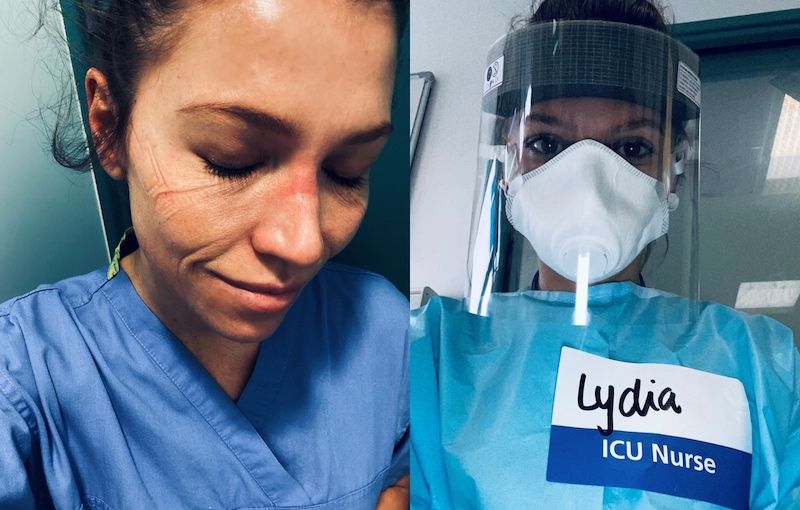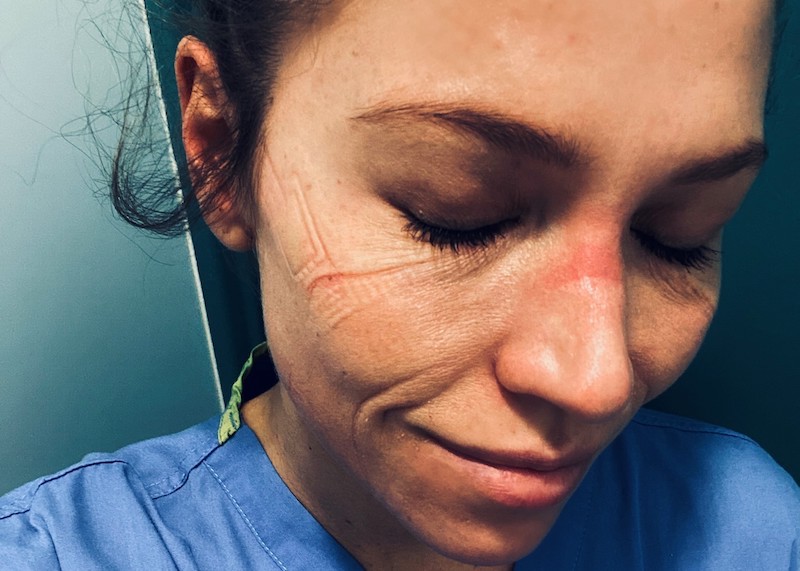

Wearing a visor steamed up with tears, ICU nurse, Lydia Taylor, holds an iPad up to a patient in her care for their loved ones to say their goodbyes. She is the only person with them when they die. This has happened so often she has lost count.
After training in Guernsey at The Institute of Health and Social Care Studies, and working at the Princess Elizabeth Hospital, Lydia was ready to spread her wings. Little did she know she was about to be frontline in a global pandemic that has claimed more than two and a half million lives.
"It’s safe to say that Covid has infiltrated every element of my daily work and life," she said.
"I consider myself lucky, I have only been in ICU during this second surge. I admire those who have been in the trenches for a year now, I don’t know how they still are, I know that many have left. It is beyond challenging, in every possible way."
Since moving to London, Lydia has worked in a large Neuro Intensive Care Unit at a major trauma centre, completed part of her Masters in the care and management of the critically ill patient, and had, what she calls, a brief dabble in the world of private healthcare – all before Covid-19 hit English shores.
Lydia is now working as a Clinical Research Nurse within the department of Infectious Diseases for a distinguished London University but during the first wave, she returned to the NHS and worked in A&E. In the second wave, she was redeployed to an Intensive Care Unit, whilst also working with the NHS Test & Trace as a Clinical Contact Caseworker, as she has throughout the pandemic.
Pictured: In a powerful first-hand account of working 13 hour shifts in what she describes as a warzone, Lydia says every day is a matter of survival.
She can’t recall the exact order of events or when exactly the virus came onto her radar.
"The panic and fear grew with the increasing attention in the news, I knew deep down that my skills meant I’d be more useful back in the NHS. In a blur, my colleagues went down with it, one of whom is still unable to work due to the effects of Long Covid."
London was plunged into lockdown, and with that, uncertainty for the frontline teams.
"Initially, there was a lot of confusion over PPE, do we wear surgical masks or do we wear hazmat suits? I had to bring my scrubs home to wash. I stripped outside the house and boil washed them.
"The fear of bringing it home on my skin, in my hair, on my clothes, was colossal. There was green A&E (non-COVID) then red (the dreaded virus), it wasn’t long until everything was red. It felt like a war was upon us."
Lydia said Lockdown 2.0 passed in a flash but, before long, Lockdown 3.0 was there and she had been redeployed to a new ICU, where she remains.
"It was scary. I didn’t know anyone. Everyone in full PPE. And the patients were sick, really sick.
She said, prior to the pandemic, it was a ratio of one nurse to one patient. However, in the surge of the pandemic, the ratio changed to one ICU nurse to four or five at the understaffed facility.
"The day is less about providing the personal 1:1, high standard of care which nurses strive for, but more about survival and attempting to get through the never-ending list of tasks.
"For the team to survive, for the patients to survive. There is a dedicated room for crying, when it all gets a bit too much."

Pictured: The marks on Lydia's face shows the effects of another long shift in the ICU.
In NICU, Lydia was exposed to a lot of trauma and a lot of death. Every injury was life changing.
“As the bedside nurse, you go through this critical time with them, beat by beat, day by day, sometimes month by month. For me, the exposure to the trauma, the death, the heartache never got easier, my skin didn’t toughen.
“The sheer volume of death faced by the ITU team during this pandemic is gigantic and not even NICU could have prepared me. A Covid death isn’t like those that came before, there is limited time for personal touches and the small things, which I think, make a death more peaceful and dignified.
“The heart-breaking thing for me is that so many families haven’t been present when their loved one has passed. Which to me, has always been the most important.’
Lydia has held up an iPad to the back of a person’s head, as they were proned and there was no way of seeing their face, telling the family that he loves them.
“I had never met that person awake, so who am I to know that those would be his chosen final words? I’m guessing, I’m just thinking of them and what might offer them some comfort. I just did my best, steaming up with tears inside my mask and visor. I didn’t have time to go to the crying room that day.”
This wasn’t a singular event for Lydia. She has no idea how many have died; there have simply been too many to count.
She seeks respite and takes the chances for a quick break if and when she can.
"The satisfaction of taking off that PPE is like stepping off an aeroplane when you arrive at your holiday destination," she describes. "A quick check for any facial pressure sores then straight to a chair, any chair."
Lydia tries to take her mind off of it, often scrolling through social media - only to come across comments that stop her in her tracks.
"It's a few seconds until a conspiracy theory pops up or someone telling the world that Covid only kills the old, the vulnerable. Tell that to the family who just said goodbye to their perfectly healthy 60-year-old husband and father. Through a screen.
"I take more deep breaths to supress the burning feeling inside my chest, I don’t have the energy to explain to the truth. I find it insulting to read the fake theories. It is insulting to me, to the team I am working with, but most importantly, it is insulting to those families and to those who have died."
She said so many nurses have left the profession during the course of the pandemic: "We are only human and we can only take so much."
Lydia added, however, that it wasn’t all as bleak as it sounded; there were heart-warming elements of the job - a camaraderie and a shared understanding between the team, that they are in it together.
“In my research role I have seen people present to hospital, have a severe illness with an ICU admission, and then seen them a month or two later, walking and talking," she recalled of the high points
‘I’ve used the iPad for a positive family call, when an 8-year-old son could see his Dad awake for the first time, he told him he loved him, he told him he loved him back. There were tears of joy inside my mask then."

Pictured: Lydia came back to the island last summer, relishing the opportunity to catch up with her family and friends without any community restrictions. She also took the opportunity to help out with a few shifts in the Emergency Department.
She said the small things are everything. The small moments of humility, of human strength in their purest form that keep her going.
"It’s a huge motivating factor when you can just try to make this a little lighter, a little brighter for a person facing a very real, a very dark and a very scary time."
Lydia has now had both of her Covid vaccinations.
"For me it was a no-brainer. It is the ultimate PPE. I am exposed to the virus every single working day. It became even more of a must when evidence emerged indicating that vaccination reduces Covid-19 transmission.
"I need to see my family, I need to see my friends, and not just see them 2 meters away. I need to hug them. I need to hug them with a reduced risk of bringing it home, reduce the risk of them being one of my next patients."
She said she understood that some people were reluctant to have the vaccine.
"I understand the concern. It’s been a year of scare mongering, fake news, a year of fear. I understand that it’s hard to contemplate having a vaccine when you personally haven’t experienced the wrath of Covid-19.
"But for me, I have and I’ll take a scientifically backed, tested and approved vaccine over having to endure another winter like this."
Comments
Comments on this story express the views of the commentator only, not Bailiwick Publishing. We are unable to guarantee the accuracy of any of those comments.